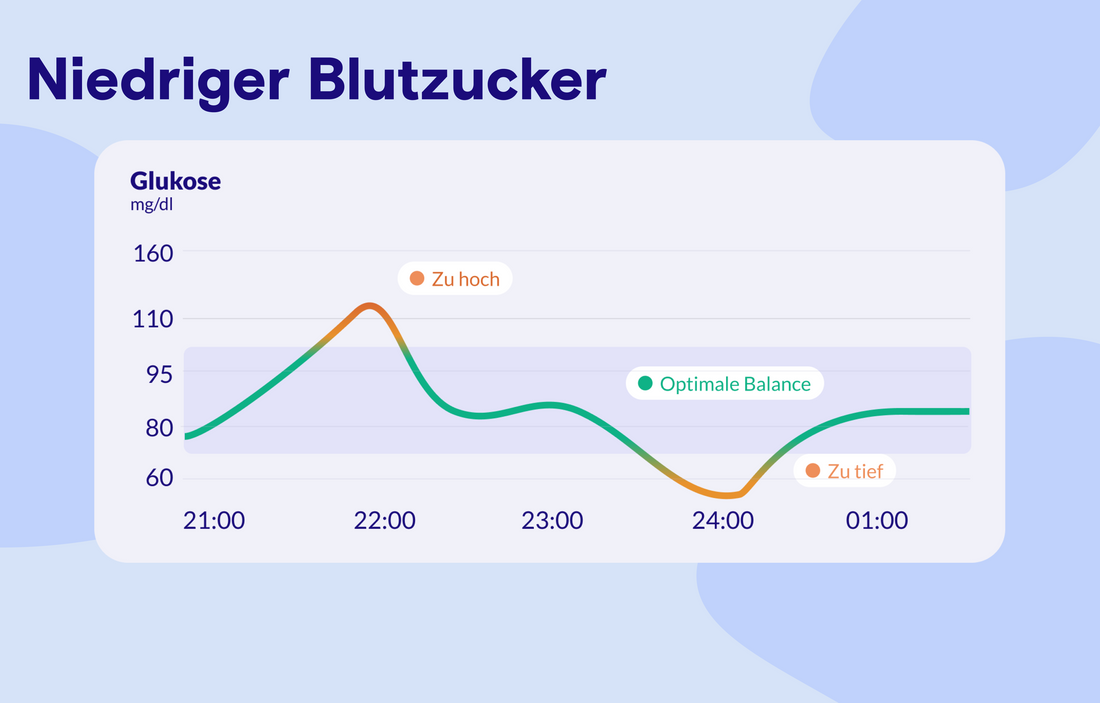When you rest and enter the sleep phase to recharge, your body continues to perform a symphony of complex processes, even when you're in deep sleep. Some people may experience low blood sugar levels at night. Low blood sugar, also called hypoglycemia, can be very confusing and unsettling.
Low blood sugar can be the reason you wake up in the middle of the night feeling sweaty, shaky, and weak. You may be wondering why this happens and what causes low blood sugar at night. In this blog post, we'll explore the reasons for this and discuss some things you can do to prevent it.
What is hypoglycemia?
Before we address the question of why low blood sugar occurs at night, we should first understand what exactly hypoglycemia is. More specifically, it's when your blood sugar level drops below 70 mg/dL. Hypoglycemia is a diagnosis for diabetics that occurs when blood glucose levels are abnormally low. Glucose serves as our body's primary energy source, and when blood sugar levels are too low, various symptoms can occur ( 1 ).
The role of insulin
Insulin, a hormone produced by the pancreas, plays an important role in regulating blood sugar levels. It helps transport glucose from the bloodstream into our cells so they can convert it into energy. However, if there is an excess of insulin or a deficiency of glucose, blood sugar levels can drop sharply.
Causes of low blood sugar at night
At night, your body undergoes various changes to support rest and recovery. While it's normal for blood sugar levels to fluctuate slightly at night, larger changes, including low blood sugar, can disrupt sleep. There are several factors that can contribute to low blood sugar levels at night. Let's look at some of the most common causes:
Late or insufficient dinner
A late dinner or insufficient carbohydrate intake can lead to a nighttime drop in blood sugar. Our bodies need a constant supply of glucose, especially during sleep, when metabolism slows down.

Intensive training in the evening
Intense exercise close to bedtime can deplete glycogen stores in the muscles and liver, leading to lower blood sugar levels at night. We don't want to discourage you from changing your exercise routine or hinder your goals. Just make sure you eat enough carbohydrates to replenish your glycogen stores so your blood sugar doesn't drop too much at night. Intense exercise close to bedtime is also more likely to lead to trouble falling asleep.
Alcohol consumption
Alcohol impairs the liver's ability to release stored glucose, leading to a drop in blood sugar levels. This effect can be even more pronounced if alcohol is consumed in the evening .
Medications
Certain medications, such as insulin or oral diabetes medications, can cause blood sugar levels to drop. It's important to stick to the prescribed dosage and consult your doctor if you suspect your medication is causing low blood sugar at night.
By addressing these potential causes and treating them effectively, you can reduce the likelihood of experiencing nocturnal hypoglycemia. If recurring episodes continue, it's important to consult your doctor for personalized advice.
Tips for preventing low blood sugar
Managing low blood sugar at night requires a multifaceted approach that includes dietary adjustments, medication (for people with diabetes), and conscious lifestyle changes.
Optimize your diet
Choosing complex carbohydrates with a lower glycemic index can help prevent drastic spikes and crashes in blood sugar levels. Eating high-quality protein, fiber, and healthy fats at evening meals can also provide sustained energy throughout the night ( 2 ).

Medication management
For people with diabetes, medication adjustments under medical supervision may be necessary to prevent nocturnal hypoglycemia. Consultation with a physician is essential to ensure the correct insulin or medication dosage, taking into account factors such as activity level and overall health. Consult your physician before making any changes ( 3 ).
Snacking before bedtime
A small, balanced snack before bed can help stabilize blood sugar levels throughout the night. Choose a combination of carbohydrates and protein, such as whole-grain crackers with cottage cheese or a slice of whole-grain bread with almond butter.
Regular blood sugar checks
Regular blood glucose measurements, especially before bedtime, are important to understand how your body reacts to various influencing factors. Keep track of your readings and learn about nighttime hypoglycemia patterns.
Blood sugar measurement made easy
Monitor your blood sugar levels to see if your lifestyle changes to prevent nighttime hypos are actually working. With our Hello Inside subscriptions, we offer a continuous glucose monitor (CGM) and premium app features to guide you on your health journey. A few simple changes can lead to lifelong better health and better sleep when hypos no longer keep you from restful sleep. Learn more about all our Hello Inside subscriptions here.
Conclusion
Hypoglycemia can be a confusing experience, but by learning about the mechanisms of blood sugar regulation and lifestyle factors, you can begin to unravel its mysteries. With knowledge of how your body works, you can make informed decisions to prevent and manage hypoglycemia—for restful nights and optimal health.
Remember that every person is unique, and what works for someone else may not work for you. Don't hesitate to consult a doctor to understand your specific needs and develop a plan to help you keep your blood sugar levels stable. With the right strategies, you can overcome the challenges of low blood sugar at night and enjoy the beauty of peaceful slumber.






